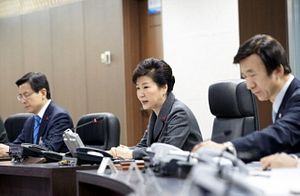Once again, South Korea’s governing Saenuri Party is racked with infighting. The center-right party is divided into two factions – one that is supportive of President Park Geun-hye and another that is opposed to the president. This divide hurt Saenuri at the ballot box during April’s National Assembly elections and, with Park caught in an explosive scandal, threatens to cause further damage in the run-up to next year’s presidential election.
Saenuri’s infighting escalated earlier this year during their nomination process for National Assembly candidates. The pro-Park faction took a heavy-handed approach, successfully pushing to de-select a number of incumbent Assembly members who were viewed as anti-Park. This was a key factor in the party’s poor election performance, where they unexpectedly lost their outright majority in the Assembly. Notably, many of the de-selected candidates retained popular support in their constituencies and were re-elected as independents.
After the election, it looked like there was hope for party unity. The party welcomed seven de-selected members back into the fold, allowing them to caucus with Saenuri. This was protested by elements of the pro-Park faction, but nonetheless looked to be putting the party back on the right track in the run-up to leadership elections in August. Park confidant Rep. Lee Jung-hyun won the party chairmanship, defeating anti-Park candidate Rep. Joo Ho-young and two others. Lee said all of the right things in his victory speech, proclaiming that “no pro-Park or non-Park factions shall exist” and promising to “reform the party structure and bring back public confidence and pave the way to victory in the upcoming presidential election.”
In retrospect, these pronouncements of unity were a mirage. Underlying divisions were blown open by what is one of the odder political scandals to emerge in recent memory. Park is embroiled in scandal due to her close ties to Choi Soon-sil, an informal adviser accused of having undue influence over Park’s administration. The scandal has garnered wall-to-wall media attention, partially because of Choi’s ties to a shamanistic cult led by her father. The scandal has led to Park forcing the resignation of all her senior secretaries, the appointment of a new prime minister, and calls for Park’s resignation from members of the opposition Minjoo Party.
On Monday, a group of 50 National Assembly members from Saenuri – nearly 40 percent of their caucus – called for the resignation of Chairman Lee and the party leadership team. Park’s approval rating has tumbled to five percent, while an early October poll had Saenuri’s approval rating at a paltry 30 percent. These factors have led to speculation about the party formally splitting, which would dramatically shake up the political scene in the lead-up to the presidential election.
South Korean political parties are notoriously unstable, often separating due to infighting and re-emerging under new banners. The opposition Minjoo Party, for example, was formed in 2014 as a merger of the Democratic and New Political Vision Parties. This precedent should concern Saenuri supporters, as there are incentives for the anti-Park faction to form a new party. The creation of a new party could also give anti-Park figures such as Kim Moo-sung a vehicle through which to contest the presidency – a powerful inducement.
The prospect of a Saenuri break-up is real. However, the party can take two steps to potentially re-unite their party. First, they could welcome members of the anti-Park faction into party leadership. At this juncture, having the leadership dominated by the pro-Park faction is untenable. If the anti-Park faction doesn’t have a seat at the table, they have no incentive to stay in the party. Second, the party could work to form a consensus around a unity candidate for president. This is much easier said than done, but an attempt needs to be made if Saenuri is to survive in its present composition.
A Saenuri split would divide the center-right vote and increase the chances of Minjoo’s nominee (or another candidate) winning the presidency. This, in turn, would have tangible policy implications on issues such as deployment of the U.S. Terminal High Altitude Area Defense (THAAD) missile system and relations with North Korea, where the two parties hold different positions. The state of affairs in Saenuri will continue to be volatile in the coming weeks; only time will tell what the consequences ultimately are.
Parker Novak is the Principal of Red Team Advisory Group, a Washington, DC-based political consulting firm, and studying for a Master’s degree in Global Advocacy at George Washington University. He earned a Bachelor’s degree in Political Science from The Ohio State University.

































